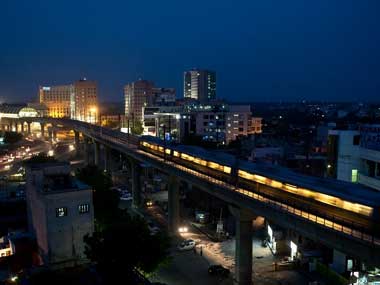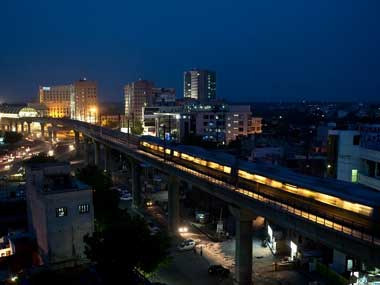Gurgaon: Will the residents of Gurgaon’s high-rises come out and vote to beat the perception that it’s only the electorate from the old semi-urban Gurgaon area which actually votes? Gurgaon’s super elite could be crucial in an election where the economic and social divide among the electorate is one of the sharpest in the country. The proclivity to vote in the average voter of this district is likely to be a decisive factor in the election results of the four constituencies of Gurgaon - Sohna-Taudu, Gurgaon, Pataudi and Badshahpur. That’s because the residents of its skyscrapers, who lead a cocooned existence within their gated communities supplied with own water and electricity, are oblivious to the lack of these basic amenities elsewhere. They are notorious for not exercising their franchise.[caption id=“attachment_1756215” align=“alignleft” width=“380”]  Will the millennium city come out to vote? AFP[/caption] Their counterparts in Bangalore had famously gone on short holidays abroad in April, when the most successful of them all, Nandan Nilekani had contested the Lok Sabha elections. The absence of his techie compatriots from the city on the polling day and the all-submerging Modi wave had ensured his defeat to the BJP candidate Ananth Kumar, but one could conjecture that the margin would have been reduced had the self-sufficient IT workers of India’s sunrise industry stayed back to vote. “Over the last two decades I’ve seen that the fate of a winning candidate in Gurgaon depends on the voters belonging to old Gurgaon and adjoining villages, and not on the rich urban voters, as the latter hardly go out to vote,” said Pappu Yadav, owner of a Dhaba at Gurgaon. However, this time there may be a change in the offing, as the aspirational class, that has come from outside to work in some of the Fortune 500 companies based in Gurgaon – ‘want a change’. Prime Minister Narendra Modi’s rally at Leisure Valley Ground on 11 October seems to have set the tone. “The urban voters of Gurgaon want change. With Modi as PM at the Centre, Haryana also deserves a break, which will benefit Gurgaon,” said Shahana Rajesh, who works with an international school in Gurgaon. “It may look grand from outside or in business centres, but residential areas lack basic amenities like roads. One has to manage independent water and power supply. Residents end up paying heavily for power backups. It’s time to shake things up,” seconds Shahana’s husband V Rajesh, a senior executive in a multinational FMCG company. “Modi’s rally will positively impact urban voters, who are looking for a change. A positive change is the need of the hour. Gurgaon needs to have proper law and order, traffic system and civic discipline, which are missing from this hi-tech city. Why can’t Gurgaon be another Singapore or Taiwan,” questions retired Maj Gen Dhruv Katoch. The ruling Congress has fielded Dharamvir Gaba for the Gurgaon seat, whereas Umesh Aggarwal and Gopichand Gahlot are the BJP and the Indian National Lok Dal (INLD) candidates respectively. Factors like caste politics involving Jat, Gujar, Punjabi, Scheduled Castes, etc; Khap Panchayats (caste council); urban-rural divide; and industrial growth versus poverty would play a decisive role in the Gurgaon district. The candidates are focusing more on voters of adjoining villages like Fazilpur, Ghasola, Jharsa etc, as they are the real vote banks. “No doubt caste politics will play a major role as always, but this time the Modi wave can’t be ruled out in Gurgaon seat,” said Subhash Goel, owner of a consumer durables showroom. Once out of urban Gurgaon, the millennium city of India, the landscape rapidly changes. It’s a study in contrast if one travels through its speedways into the dusty hinterland. The poster city of India’s realty growth in the post-liberalisation era, is an island surrounded by rural areas that make up the Gurgaon district, and whose ruralness appears starker because of the soaring skyscrapers in the Gurgaon city. Habitations here, literally, are not separated by kilometers but by centuries. One gets to see Khap panchayat members in traditional white clothing sitting in small circular groups smoking hookah at the premises of the BJP candidate Tejpal Tanwar’s office at Taudu. Caste politics is brewing strongly, as Taudu is traditionally a Congress bastion, with nearly 50,000 Muslim voters, 45,000 Gujar, 8000 Jat and 32,000 SCs including Yadavs. “Here the Congress candidate Rohtash Bedi’s personal equation with the voters will play an important role, because he was instrumental in the creation of Taudu assembly seat out of Gurgaon,” said Varun Bhati, a property dealer. But, according to the locals, more than any issue, voters prefer to vote for that candidate, with whom they can associate at personal level and flaunt around claiming, ‘This MLA is my friend and will be there at my beck and call’. The other two assembly seats – Badshapur and Pataudi are no different. The BJP has fielded a strong candidate Rao Narbir Singh from Badshapur against Virendra Yadav of Congress, who is considered comparatively weak. “INLD is leading from this area. Chautala’s imprisonment will get the party sympathy votes and his rallies have made a big impact on voters,” property dealer Vinod Kumar at Badshapur and grocery shop owner Rafiq jointly claimed.
The proclivity to vote in the average voter of this district is likely to be a decisive factor in the election results of the four constituencies of Gurgaon - Sohna-Taudu, Gurgaon, Pataudi and Badshahpur.
Advertisement
End of Article


)
)
)
)
)
)
)
)
)



